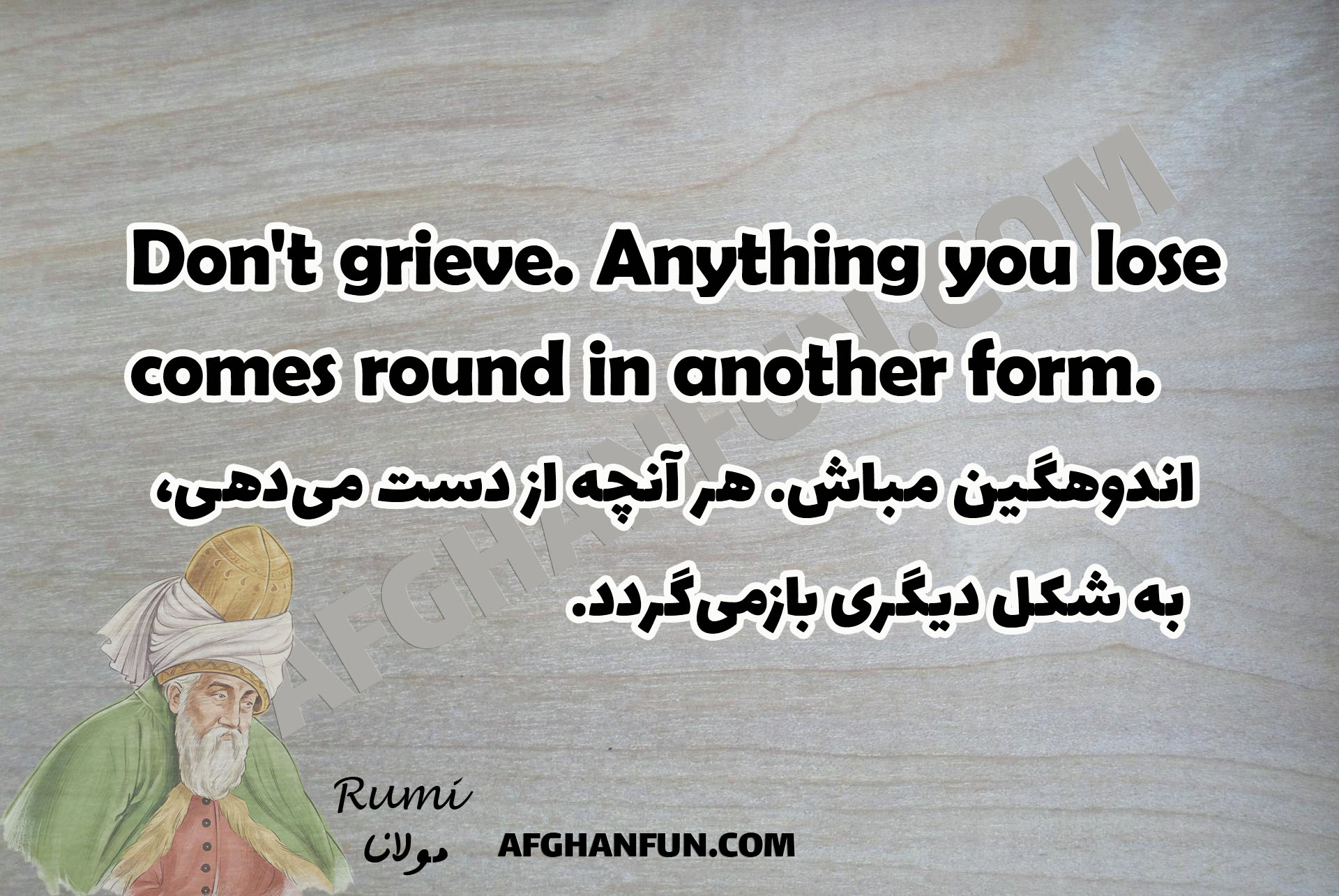Don’t grieve. Anything you lose comes round in another form.
Rumi
Ғамгин мабош. Ҳар чизе ки аз даст медиҳӣ, ба шакли дигар бармегардад.
МАВЛОНО ҶАЛОЛУДДИН МУҲАММАДИ БАЛХӢ
Ин суханони Мулавӣ ба як назарияи ҳаёти равшан ва рӯҳонӣ ишора мекунад. Ӯ мегӯяд, ки одамон бояд ҳангоми гум кардани чизҳо нағзиш накунанд, зеро ҳар чизи гумшуда ба шакли дигар ба зиндагӣ бармегардад. Ин нишон медиҳад, ки табиат ва зиндагӣ дуруст аст ва ҳамаи чизҳо дар як цикли табии нигоҳ дошта мешаванд.
اندوهگین مباش. هر آنچه از دست میدهی، به شکل دیگری بازمیگردد.
این سخن مولانا نشاندهنده یک نگاه فلسفی و معنوی است. او از این طریق به انسانها یادآوری میکند که در مواجهه با مشکلات و از دست دادنها نباید غمگین شوند، چرا که آنچه از دست میرود به شکلی جدید و در قالبی دیگر بازخواهد گشت. این دیدگاه به نوعی به استمرار و چرخه طبیعی زندگی اشاره دارد و باور به این که هیچ چیزی از بین نمیرود، بلکه تغییر میکند.
لا تحزن. كل شئ تخسره، يعود لك بصورة جديدة.
ِمولانا جالا الدین الرومی
عربی: هذه المقولة من مولانا تحمل رؤية فلسفية وروحية عميقة. يشير فيها إلى أن الإنسان لا ينبغي أن يحزن على ما يفقده، لأن كل ما يضيع يعود بشكل آخر. هذه الفكرة تعكس إيمانًا بديمومة الحياة وبدورة الكون التي لا تنتهي، حيث لا شيء يضيع بل يتحول إلى شكل آخر.
Analysis of the Quote by Rumi:
“Don’t grieve. Anything you lose comes round in another form.”
This profound statement by the 13th-century Persian poet and mystic, Jalal al-Din Rumi, holds deep spiritual and philosophical significance. At its core, Rumi is offering a comforting perspective on loss and the cyclical nature of existence. Here’s a breakdown of its key elements:
- Embracing Change: Rumi emphasizes that loss is an inevitable part of life, but he urges us not to mourn it excessively. Rather than seeing loss as a final end, he suggests that it is part of a broader cycle of transformation. What we perceive as a loss may, in fact, be a shift into a different form or phase, reinforcing the idea that life is constantly in flux.
- The Concept of Impermanence: Central to many spiritual traditions, especially in Sufism (the mystical branch of Islam with which Rumi was associated), is the concept of impermanence. Everything in life is transient, and nothing lasts forever in its current state. Rumi encourages acceptance of this natural flow, helping people shift their mindset from resistance to acceptance. Loss is not something to grieve endlessly, but rather something to understand as part of a greater, inevitable transformation.
- Transformation and Rebirth: The statement suggests that even in moments of apparent loss, there is potential for rebirth. This may refer to both external changes (such as a person, a relationship, or material possessions) and internal transformations (such as spiritual growth or emotional healing). Rumi hints at the idea that what is lost might return in a different form, perhaps not as we expect but still valuable in its new manifestation.
- Spiritual and Mystical Dimensions: Rumi’s teachings often focus on the soul’s journey toward union with the divine. In the mystical sense, loss and grief are seen as stepping stones toward a deeper understanding of the self and the universe. The process of loss can strip away the superficial, allowing the individual to experience a more profound connection to the divine, something that might not have been possible without the transformative power of loss.
- Cyclic Nature of Existence: The idea that what we lose “comes round in another form” also reflects the concept of cycles that govern existence. Just as the seasons cycle from birth to death and rebirth, so too do human experiences. This cyclical pattern suggests that loss is not permanent; it is simply part of a greater rhythm of life, death, and renewal.
- Philosophical Perspective: Rumi challenges the conventional understanding of loss. Instead of seeing it as something to be mourned, he invites us to reframe our perception of loss as a transition, a shift, or a metamorphosis. In essence, the message encourages resilience, perspective, and spiritual growth in the face of life’s inevitable changes.
Conclusion:
In essence, Rumi’s quote teaches us that life is not about holding on to what we have, but rather about accepting the flow of change and recognizing that loss is a necessary part of life’s rhythm. The grieving process is natural, but Rumi reassures us that what we lose is never truly gone; it merely returns to us in a different form, more aligned with the ever-changing dynamics of existence. Through this lens, loss can be viewed not as an ending, but as a transformation, a moment for new possibilities and experiences to arise.











